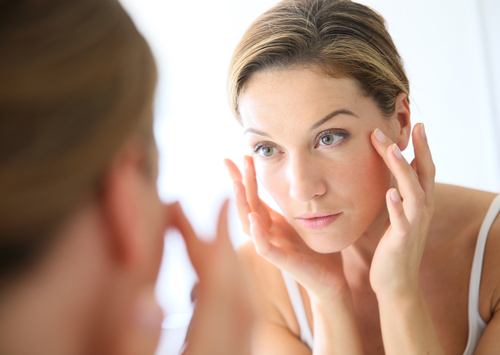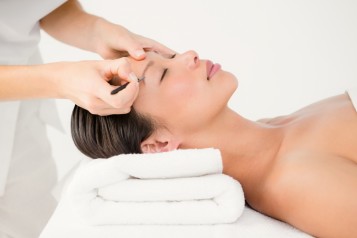Patients ask me all the time to help understand what causes their face to age. Why do I have all this extra skin, more lines, falling cheeks? I do my best to explain the effects of aging and help them understand the process, how it occurs, what the future holds and what can be done. There are 3 processes that occur in unison that together produce changes that cause us to appear older.
During the consultation, I encourage my patients to bring photos of themselves from 5-10 years ago as I find it to be a wonderful tool in helping demonstrate the visual effects of aging.
1- It starts with a loss of volume–this is more noticeable when you look at the area under the eyes and upper cheeks. You can see the space between the lower eyelid and ‘apple of the cheek’ gets longer. This does not occur from the cheek dropping, but from a loss of fat under the skin with aging. Think of a balloon stuck to a wall, slowly deflating–over time, you will see increased lines and sagging on the balloon. The amount of ‘skin’ has remained the same, but the volume has gone, so it appears ‘older’. This is why we get hollowed under the eyes and the lines around the mouth become deeper. Other areas where we lose volume are in the temples, cheeks and lips.
This volume loss starts in our late 20’s and 30’s and continues as we age. This is what drives the whole ‘injectable filler’ market. A couple syringes of filler can refresh and rejuvenate one’s appearance immediately, with little downtime, making you appear less tired and more youthful. When performed correctly, increasing facial volume can have the added benefit of lifting the soft tissues of the cheeks which can soften the lines around the mouth (nasolabial lines and marioette lines) and tighten your jawline. Fillers can vary depending on what you’re looking for from temporary injectables to a more permanent solution with fat transfer or implants.
2- Next, there is a loss of skin elasticity–As we age, you will see increased lines and extra skin around the eyelids, mouth, jawline and neck. These lines get deeper as we age and chronic sun exposure can further amplify this process. The loss of elasticity in our skin also leads to more stretching and less return to a tight appearance. To help you understand, think of a rubber band. Initially, the band is nice and taut. As time and use increases it eventually loses its elasticity. The repeated use is everyday life—smiling, laughing, turning our heads, etc. Other habits such as increased sun exposure, smoking or just genetics further contribute to this. For nonsurgical solutions, regular skin maintenance, sun avoidance can help maintain skin elasticity.
Other treatments such as laser skin resurfacing, and devices that use radiofrequency, ultrasound (Ulthera) or heat energy-based devices can be performed to tone and tighten lax skin. The most exciting in this area is the use of stem cells and platelet rich plasma (PRP)- these have the potential to rejuvenate and turn back the clock on the collagen producing cells that tend to ‘turn off’ as we age, thereby restoring and rejuvenating skin elasticity and facial volume.
3- Finally, there is a change in facial shape. The combination of the above factors causes our overall facial shape to change from a youthful heart shape (where the top of the heart is the fullness in the cheeks and the apex of the heart is at the chin) to an older square shaped face, (where the top of the face has deflated and the jowls around the mouth cause a more square appearance). Once this occurs, surgical intervention will be required to further maintain a restored and youthful appearance. These procedures range from eyelid lifts, brow lifts, or face and neck lifts. The goal is to bring you back to where you were about 10 years ago.
The pattern of aging is relatively predictable and the process is well understood. As a facial plastic surgeon, I have resources available to address every aspect of facial aging to ‘lift’, refresh and renew ones appearance.
Aging face changes- hope it’s a little clearer.
Dr. Dilip D. Madnani, MD, FACS is a dual board certified facial plastic surgeon. www.drmadnani.com.
For more information, visit Dr. Brian A. Levine's social media:


























